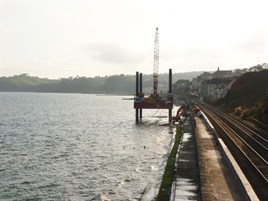“I first met him as he climbed out of the hole at Dawlish,” says Burnell. “There had been waves and rain, and he was the epitome of the phrase ‘drowned rat’.”
Warburton is described as a character. He makes jokes, but is straight and to the point when discussing his work.
“As a job it has been a challenge. It’s been a great team-building exercise, eventful on every level and good to bad at times.
“I came from Essex as construction manager. I volunteered for the weekend and am still here. I love emergencies. I was the shift manager for night shifts, and once we got the situation controlled I reverted to days.”
Despite being a manager, Warburton says he still likes to get his hands dirty working. And working on the wall was new for him.
“I didn’t know anything about the sea. I understand tides now. It was a vertical learning curve. It was civils in a rail environment. Marine is not as regulated as rail.
“One problem was that I didn’t know anyone. But it is a task you have to deal with, because you have to fill the hole. The best thing we did was bring in non-PTS operatives.”
He says this is because for many of the railway staff the marine world was new, and so staff were far more careful. “We did 53 days with two incidents. I believe the extra care was there.”
Warburton has been at Dawlish so long he has a long-standing booking at a hotel near Dawlish Warren - the owners even invited him to their granddaughter’s wedding. He travels home every other weekend (when he can) to see his children.
He says his role now is “doing logistics, project manager, operations and designing management for the works for the rebuilding of the sea wall”. He has even undergone training for working on a barge, which has included life-jacket training, although: “You don’t have to swim to work here, because you are hooked on to the sea wall.”
But he loves it in Dawlish: “There’s lots of people who you would never meet. The craic here is brilliant.”
And he says that helps the team: “At the moment it’s long, stressful days. It is backs against the wall. When you stand back there is a sense of pride.”
Warburton tells RAIL that the work has to move much faster than usual.
“You would go through the GRIP stages normally in 18 months. That process has had to be done in 18 hours at times, and we are still reacting to things. We are working 24 hours a day, and yet have to rely on desktop studies and so people are trying to keep up.”
He remembers April 4 well. “I watched the first train, shaking, to make sure it was OK.”
What does he think of this job?
“It brings out the best in guys. I hate planned jobs. Some people don’t like changes, but I want the pressure. And it is still like that. It is still changing. For instance, while we have designed everything, we don’t know what is under the wall.
“But we will be out there. We will do what we physically can. The guys here will do that.”
His attitude encapsulates exactly why Network Rail was awarded the Judges’ Special ‘Orange Army’ award. It is richly deserved.
- This feature was published in RAIL 760 on 29 October 2014
















Login to comment
Comments
Chris Gooding - 27/09/2018 22:02
It would still be beneficial to reopen the old LSWR line via Okehampton and Tavistock.. It will happen again and the people in and around Devon and Cornwall stranded.. costing the Government Billions in lost revenue. Reopening this line will help businesses grow. Aid traffic issues in and out of Plymouth towards Tavistock. Finally a diversionary route if this sea defences fail again in which it will. Not maybe. Having a circular route with 3 trains running each way would give a half hr service for locals into and out of Exeter and Plymouth. Great for commuter also for tourism.. Still have your cross country services and GWR keep there services. Rail Infrastructure for the south west needs a revamp it is falling so far behind the rest of the UK. re dueling the Salisbury to Exeter line. extending the electrification programme to Exeter via Bristol and the Reading to Taunton line. This is what the south west needs.. good fast rail system to Bristol and to the Capital.